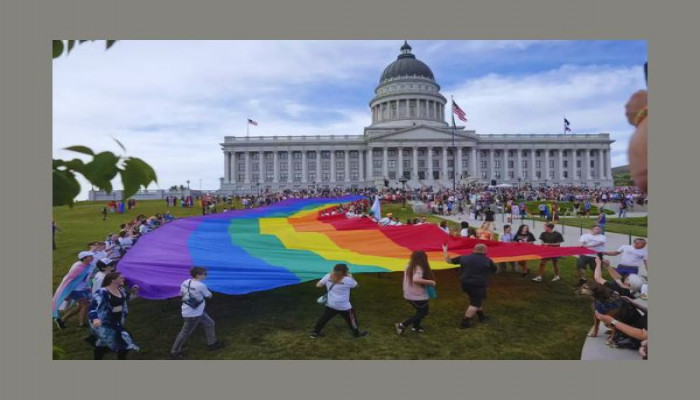Utah becomes first state to ban LGBTQ+ pride flags in government buildings and schools
- In Reports
- 12:40 AM, Mar 30, 2025
- Myind Staff
Utah has officially become the first state in the U.S. to ban LGBTQ+ pride flags from being displayed in government buildings and schools. The law, which prohibits unsanctioned flag displays, was allowed to take effect without the signature of Republican Governor Spencer Cox, who expressed concerns but chose not to veto the measure, citing the likelihood of an override by the GOP-controlled Legislature.
Why Was the Ban Passed?
The Republican-backed legislation, set to take effect on May 7, aims to enforce political neutrality in public institutions. Under the new law, state and local government buildings will be fined $500 per day for displaying any flag not on an approved list. Flags that remain permissible include the U.S. flag, the Utah state flag, military flags, and a select few others approved by lawmakers. Political banners, including former President Donald Trump’s “Make America Great Again” flags, are also prohibited.
Backlash and Legal Questions
The new measure has sparked controversy, particularly in Salt Lake City, where local officials have frequently flown LGBTQ+ pride flags in support of the city's large LGBTQ+ community. During Pride Month in June, city buildings traditionally display rainbow flags, and in response to the legislation, Salt Lake City has illuminated its government buildings in rainbow colours as a form of protest.
Andrew Wittenberg, a spokesperson for Salt Lake City Mayor Erin Mendenhall, stated that the city’s legal team is currently evaluating the law. “We don’t yet have information on what steps will be taken once the law is in effect,” he added.
Supporters and Opponents Weigh In
Republican lawmakers behind the bill, including Rep. Trevor Lee and Sen. Dan McCay, argue that the law promotes neutrality in public spaces. They insist that it prevents government employees and teachers from engaging in political expression while on the job.
Critics, however, view the law as an attempt to suppress LGBTQ+ representation. They argue that it strips local governments of decision-making authority, particularly in cities with more liberal policies that differ from the state's Republican leadership.
Governor Cox’s Stance
Governor Cox expressed mixed feelings about the legislation. While he supports political neutrality in schools, he acknowledged that the law could overstep by restricting local government decisions. He also noted a potential loophole, as the legislation specifically targets flags but does not regulate other forms of political expression such as posters or lighting displays.
“To our LGBTQ+ community, I know that recent legislation has been difficult,” Cox wrote in a letter explaining his decision. “Politics can be a bit of a blood sport at times, and I know we’ve had our disagreements. I want you to know that I love and appreciate you and am grateful that you are part of our state. I know these words may ring hollow to many of you, but please know that I mean them sincerely.”
Impact on Utah’s Reputation
The passage of the law coincided with the Sundance Film Festival’s decision to relocate from Park City, Utah, to Boulder, Colorado. While festival organisers stated that politics did not directly influence the move, they emphasised “ethos and equity values” as key factors in selecting Boulder, describing it as a “welcoming environment.”
A Growing Trend Across the U.S.
Utah’s legislation is among the most restrictive flag policies in the nation. It surpasses a similar law in Idaho, which only applies to schools. However, Idaho lawmakers are considering a separate bill that would extend the ban to government buildings. Florida is also advancing legislation that would prohibit pride flags and other politically affiliated symbols in public spaces, though previous attempts have failed in the state legislature.
Some federal agencies, including the Department of Veterans Affairs, have also adopted policies restricting which flags can be displayed at their facilities.
What Flags Are Still Allowed?
Despite the new restrictions, certain flags remain permitted in Utah. These include Olympic and Paralympic flags, tribal flags, official college and university flags, and historical versions of approved flags for educational purposes.
As the law prepares to take effect, debates over political expression, government neutrality, and LGBTQ+ rights continue to shape the conversation in Utah and beyond.







Comments